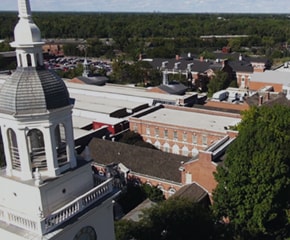
COVID-19 Collections
1) How are we being INNOVATIVE?
What are the high-level, nationally significant economic, political, and social responses and trends? How has this changed over the course of the pandemic? This includes the areas of: health care, manufacturing, energy, transportation, technology, government, the food industry and grocery supply chain, the service industry, the sports and entertainment industries, and the environment.
Topics include:- Government (e.g., CDC guidelines, state vs. national directives, unemployment, economic stimulus, protest, postal service, reopening plans)
- General societal responses to directives (and how these have evolved over time), such as: washing hands, social distancing, staying home/quarantining, disinfecting surfaces, wearing masks
- Health care (e.g., PPE, signs, letters, telemedicine, testing kits and sites)
- Manufacturing (e.g., repurposing to produce ventilators, face shields, hospital gowns and other medical supplies, hand sanitizers, alternate products to ease shortages)
- Food industry, (e.g., supply chain, food to first responders/elderly/needy, meat packing, agricultural laborers, volunteerism)
- Other consumer products (nonfood) supply chain (e.g, toilet paper, hand sanitizer)
- Technology (e.g., data tracking in public health by Google and Apple, vast increase in use of technology and teleworking tools)
- Science (e.g., source of virus, quest for vaccine)
- Entertainment (e.g., virtual concerts and shows as fundraisers)
- Sports (e.g., league responses)
- Public transportation (e.g., air, ground)
- Private transportation (e.g., cars, gasoline)
2) How are we being RESOURCEFUL?
What are the national trends in grassroots responses by individuals, families, neighborhoods, and communities (local, regional, national, and online) to daily life issues and struggles? How has this changed over the time of the pandemic?
Topics include:- Individual responses to grocery shopping (e.g., stockpiling, limiting, going at certain times, mailorder, making do, doing without, home cooking)
- Adapting to canceled schools (e.g., homeschooling, online lessons)
- Maintaining traditions and finding alternate ways to celebrate holidays (e.g., Zoom get-togethers, making or purchasing special foods, making do)
- Grassroots responses to shortages of essential items (e.g., making and adapting face masks, making your own hand sanitizer, substitutes for toilet paper)
- Grassroots responses to thanking first responders (e.g., hearts, white ribbons, door and window signs)
- Maintaining some semblance of normalcy with regular activities in work, college, family life
- Connecting to community (e.g., neighborhood cocktail parties, Facebook groups and group watches, Facebook popularity in general, online book clubs)
- Self-care (e.g., exercise, yoga, meditation, outdoor activities)
- Attending to neglected home-based projects previously put off (e.g., painting rooms, organizing, sorting out and pitching)
- Taking time for creativity through craft and art projects (e.g., quilting UFOs, knitting, artwork)
- Filling in time during quarantine (e.g., puzzles)
- Churches with new online services
- Meal service – online, takeout, delivery
- Child care/activities for children (e.g., scavenger hunts in neighborhoods, sidewalk chalk pictures, online birthday celebrations)
- Increased demand for seeds, food sources
3) How are ENTREPRENEURS and BUSINESSES using their INGENUITY?
How are entrepreneurs of large and small businesses using their ingenuity to address people’s needs during this time and remain sustainable now and after this is over?
Topics include:- Grocery store responses and changes through time to keep staff and customers safe (e.g., limiting numbers, disinfecting carts, protective shields, senior hours, maintaining 6-foot distance while standing in line, one-way aisles, curbside delivery, delivery services)
- Design, invention, and production of creative tools and products to address the crisis (e.g., products designed by IDSA designers, Etsy products, Sharper Image products)
- Shifting business plans and business models to meet current challenges, remain in business, and provide needed goods and services to customers (e.g., restaurants doing carryout and curbside pickup, food establishments selling basic groceries like Potbelly Pantry, increase in mail-order businesses, chain stores like Barnes & Noble and garden stores offering curbside pickup)
- Companies helping to coordinate volunteer opportunities for their employees, especially based on specific skill sets (e.g., FMC)
- Bespoke American clothing companies (Marine Layer and Hedley & Bennett) that have been running buy-one-give-one-to-hospital-worker mask programs
- Effect on seemingly bulletproof unicorn tech-based startups and platforms: Airbnb, etc.
- Workers’ safety rights and upheavals related to online shopping experiences we’ve come to rely on: Amazon Prime, Shipt, Instacart, Whole Foods Online
- How hotels are responding (housing health care workers, rooms to the homeless, conversion to hospitals, being used as flexible workplaces during the day)
If you believe you have material that may be of interest, or have questions about the collecting initiative, please email us at covid19collecting@thehenryford.org. Please note that we are unable to receive items on to our campus at this time. If we determine that your offer would be a good fit for our collections, we would ask that you hold onto it until we are able to make arrangements to have it delivered or dropped off to our site.


